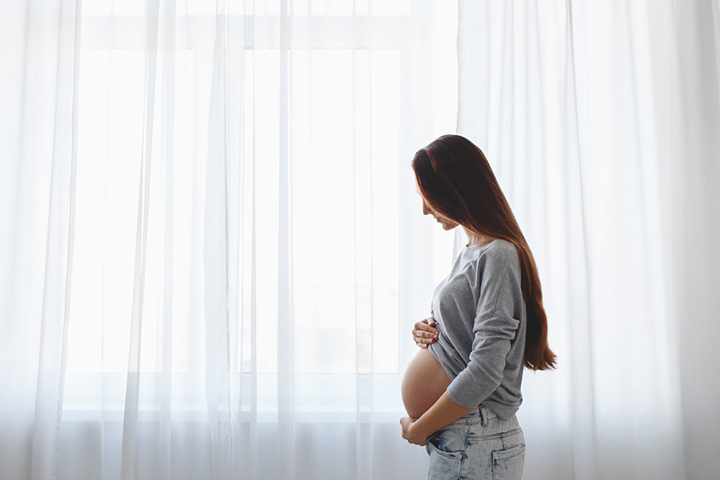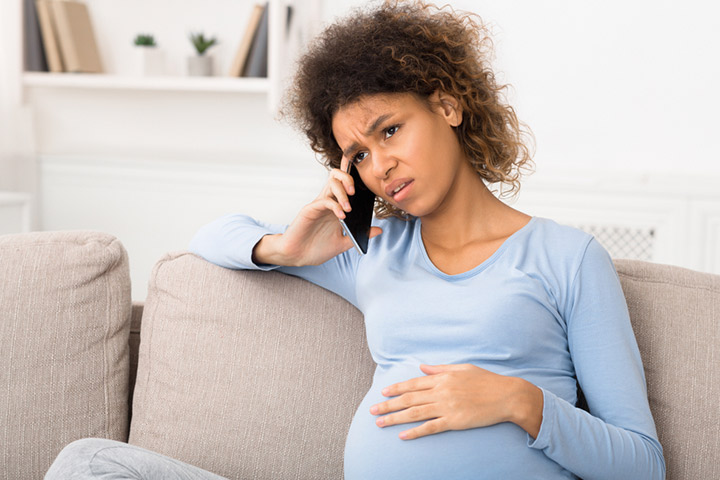
Image: Shutterstock
When we hear the word pregnancy, we often think of the beautiful pregnancy glow, luscious locks of hair, and joy and excitement in the air. But let’s not sugar coat it; we also think of frequent visits to the loo, constant backache, and the inability to look at our toes, thanks to our growing belly. All this is often spoken about, so we are most likely to be aware (1).
However, how often do you come across a wet top, thanks to leaky breasts? Not that often, we’re sure! Yes, leaky breasts aren’t just a consequence of breastfeeding, it can also be a side effect of pregnancy (2). If you’ve been experiencing leaky breasts, don’t freak out. Nothing is wrong with you, and it is a normal part of pregnancy, although lesser-known. We’re here to help you find out why it happens and what you can do about it. So, keep reading:
What Causes Leaky Breasts During Pregnancy?
There’s a culprit responsible for leaky breasts, and it’s called Colostrum. Colostrum is essentially the first milk that comes out before you start breastfeeding your baby. Usually, it is yellow in color and thick in consistency. Thanks to its numerous benefits, it is considered a superfood and is even called liquid gold (3).
Packed with antibodies, high protein, and chock full of nutrients, just a little bit of colostrum can provide a good number of nutrients for your newborn. In some cases, your breasts may start to leak out colostrum even before your baby has arrived (4).
This is entirely normal, and there is nothing to worry about. In fact, it is your body’s way of preparing for your little one.
When Do Expecting Mothers Usually Start Producing Milk?
You’ll be surprised to know that expectant mothers can start producing tiny amounts of milk or colostrum even at the start of their pregnancy, as early as three or four months into it. Pain in the breasts and even swelling is a classic sign that your breasts are preparing for the newborn. By the time you reach the second trimester of your pregnancy, your milk duct system is fully prepared and developed. This way, even if your baby is born premature, your breasts are fully equipped to feed your baby when they arrive (5).
Are Leaky Breasts A Cause For Concern?
If you’re worried about your leaky breasts during pregnancy, we are here to tell you why you don’t have to be. It’s not a problem, nor is it unusual. This is your body’s way of preparing for the arrival of your baby. Your hormones are at play, and up until you have delivered your baby, you won’t actively produce excess milk. You will have leaky breasts, although hormones such as progesterone and estrogen will prevent you from leaking out extra milk. You will most likely experience leaky breasts during the last few weeks of pregnancy. However, you will notice an increase in the leakage when there is an increase in your movements, such as when your nipples rub against your top or when you walk (4).
What You Can Do About Leaky Breasts
Truth be told, leaky breasts are a normal part of pregnancy, so there’s nothing much you can do about it. However, here are a few things you can do to help with the unease:
- Make sure you carry a good number of tissues to dab yourself when you begin leaking.
- Invest in a few nursing pads. They prevent your t-shirts or tops from getting soggy or stained.
- Wear clothing that is loose and comfortable instead of tight-fitted clothes that can cause friction and stimulate leaking.
- Talk to your doctor about any discomfort that you may be experiencing.
When You Should Be Worried
Although leaky breasts are normal and not unusual during pregnancy, there are a few things that you should watch out for. Notify your doctor if you experience severe pain and discomfort in your breasts. Leaking colostrum is normal, but if this is accompanied by blood or other discolored discharges, bring it to the notice of your healthcare provider. Colostrum has a thick consistency, but if you notice a discharge that is too thick and creamy, then it is best to get it checked. Also, in most cases, you will leak a few drops at a time, but if you observe too much of a flow, it could be a cause for concern. The nursing pads should ideally be enough to prevent your clothes from getting too wet, but if even these pads don’t help, seek your doctor’s advice (6).
Pregnancy can put you through a lot of changes, both physically and mentally. In most cases, these changes are not a cause for concern, and you will return to normal soon after childbirth. Leaky breasts during pregnancy shouldn’t freak you out, but go ahead and tell your doctor about it anyway. Did you experience leaky breasts when you were pregnant? Let us know in the comments below!
















